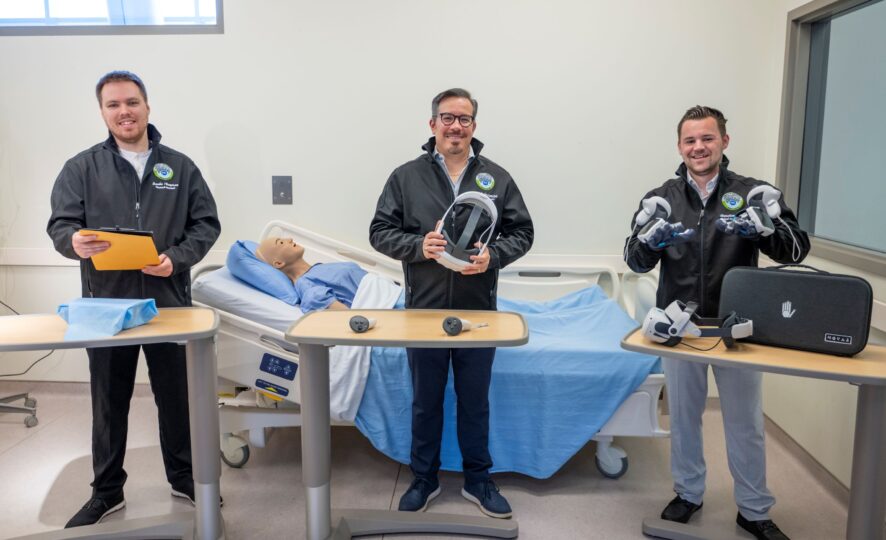Researchers from Niagara College’s Myhal School of Nursing will be travelling overseas later this fall to showcase their work on simulation-based training in nursing education.
Since May, Honours Bachelor of Science in Nursing (BScN) degree program Professor and Coordinator Dr. Holldrid Odreman and second-year BScN students Christian Baltus and Joshua Thompson, have been working on a research study called ‘Self-Confidence and Modulation of Performance Anxiety Through Simulation-Based Learning.’
The study, which is still in progress, will be among a grouping of innovative research works featured at the Association for Simulated Practice in Healthcare (ASPiH) 2025 Conference taking place November 11-13 in Bournemouth, UK.
The ASPiH Conference is at the forefront of advancing simulation-based education, bringing together experts, educators, and innovators to share insights, best practices and cutting-edge developments in the field.
Dr. Odreman and Baltus will represent the BScN program and research team at the event.
“This conference is a valuable platform to highlight the impactful research being conducted by our students and faculty and we’re thrilled to represent Niagara College’s BScN program,” said Dr. Odreman, who is also the nursing research stream lead at NC’s Centre for Research in Education. “It’s an incredible opportunity to share our research on simulation-based training with an international audience of healthcare educators and professionals.”
Through the study, Dr. Odreman and his student researchers have been analyzing data on how different training methods affect nursing students’ confidence and anxiety when performing a high-pressure skill.
Three training methods are being used in the study, incorporating both traditional tools and Virtual Reality (VR) technology: VR with controllers, VR with touch-sensitive gloves known as Haptic Gloves, and a mannequin task trainer (traditional tool).

BScN student Christian Baltus has played a key role in coordinating the simulation environment used in the study as the Co-investigator on the research team.
Participants, who are also NC nursing students, are randomly assigned to one of the training methods with each method teaching the participant the same high-pressure skill – the insertion of a urinary foley catheter. This complex skill was strategically selected by the researchers as it is known to cause the most performance anxiety in students.
Participants are then tested on how well they remember how to perform the skill accurately and whether the method used helps participants feel less anxious while performing the skill.
Dr. Odreman noted that studying the topic is important since psychological factors play a major role in how students learn and perform during their training.
“Nursing education involves high-stakes, hands-on learning where students must quickly apply knowledge in simulated or real clinical settings,” he said. “If students struggle with low confidence or high anxiety, it can hinder their ability to learn effectively, make decisions, and perform essential skills.”
“By studying these issues, our Myhal School of Nursing can develop better teaching strategies and support systems, like advanced technological simulation-based training, to help students feel more prepared, capable, and resilient as they transition into professional practice,” Dr. Odreman added.
Working on the study has been a rewarding experience for the students on the research team.
Baltus, who is Co-investigator, has been involved in all aspects of the research study, including recruiting student participants and working with partners MedVR Education and Sense Gloves on the simulation training environment.
A natural leader, he has valued the opportunity to dive into the study and encourages all BScN students to get involved in research for their personal growth.
“There’s opportunities within a research team, no matter what your role is, to become a leader, to guide individuals through a process, or to inspire others to do things that they possibly would have never considered they would have the potential for,” said Baltus. “These all encompass what can be offered within the Bachelor of Science in Nursing degree program.”
As Research Assistant, Thompson has supported participant recruitment and training, handled inventory and setup of research materials, and has taken on manuscript and publication work. “It’s been a huge learning process, but it’s been very engaging and fruitful to see the research come together,” he said.

Student Joshua Thompson is gaining valuable experience working on research through the BScN program.
Both students, who are also alumni from NC’s Pre-Health Sciences Pathway to Advanced Diplomas and Degrees program, Baltus in 2018 and Thompson in 2024, conducted research with Dr. Odreman during the first year of their studies and hope to gain more knowledge and experience in the area as they complete the four-year program.
For now, the researchers continue to gather data for their latest study and look forward to sharing preliminary findings at the ASPiH 2025 Conference in Bournemouth next month.
Related article: Nursing degree students participate in NHKI Research Day


